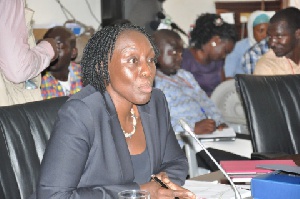Ghana is determined to fight crime to make it dissuasive for those who choose to indulge in it, Mrs Marietta Brew Appiah-Opong, Minister of Justice and Attorney-General said on Tuesday in Accra.
“We are determined to freeze, prosecute and confiscate proceeds of crime to disable the economic capabilities of criminals and ensure that our beloved country does not become a hub or safe haven for criminals,” Mrs Appiah-Opong said in an address read on her behalf at the opening of a three-day National Risk Assessment (NRA) workshop.
The workshop being attended by stakeholders from representatives of security agencies, civil society groups, banks and the private sector is aimed at developing a blueprint to address money laundering and terrorist financing in Ghana.
An NRA would also inform decision-makers on how resources would most effectively be assigned to public bodies and designated competent authorities and how they would make use of these possessions in an effective manner.
Participants would brainstorm on a World Bank NRA model, that would inform them in coming out with a document tailored to the circumstances of the country.
Mrs Appiah-Opong said the workshop was timely because of the spate of the high incidence of insecurity in West Africa and the world as a whole which present as fertile ground for transnational organised crime including money laundering (ML) and terrorist financing (TF).
She said the outcome of the workshop would among others enable Ghana to deploy its scare resources judiciously to address critical segments that are vulnerable.
“The final blueprint of the NRA exercise which foundation is being laid today will place Ghana in a better stead for the next round of mutual evaluation that would be conducted in 2016 on the basis of assessing the effectiveness or measurable achievements made as a result of the AML/CFT (Countering the financing of terrorism) measures of the country”, She noted.
Mrs Appiah-Opong said Ghana’s NRA should be built on sound foundations while efforts must be made to ensure that the risks are well identified, assessed and understood.
The NRA, she said, should be based on an assessment of the threats, vulnerabilities, consequences and the likelihood of crime to be committed.
She charged participants to consider factors that may influence the risk of money laundering and terrorist financing such as the political environment, legal environment, the country’s economic structure, and cultural factors and the nature of civil society.
She said the nature of payment systems and the prevalence of cash-based transactions, types of products and services offered by financial institutions as well as the main channels, means or instrumentalists for the commission of money laundering or terrorist financing activities must be considered.
Mr Mu’ Azu Umaru, Director of Research and Planning of Intergovernmental Action Group against Money Laundering in West Africa (GIABA) said Ghana had become a distinguished pillar in the regional drive on anti-money laundering (AML) and CFT.
He said GIABA and the World Bank is therefore assisting Ghana as the first country in West Africa to come out with the NRA document that could also guide other sub-regional countries to design similar document to address AML and CFT.
He said the conduct of the NRA was an obligation under the Financial Action Task Force (FATF) recommendations that obligate countries to conduct a national ML/TF risk assessment.
Mr Umaru said Ghana, Nigeria and Senegal would be the first countries to be evaluated under a second round of mutual evaluation in 2016.
Ms Cari Votava, Senior Financial Sector Specialist, of the World Bank said the NRA was an initiative of the World Bank which had become a requirement for all counties to help in the fight of anti money laundering and financing of terrorism.
Mr William Aboah, National Security Adviser, urged participants to come out with a good document that would also serve as a central data-base for intelligence collections in Ghana.
“You should be mindful of the activities of such criminals who would always want to be ahead of us and we need to design something that would counter their activities," he added.
Business News of Wednesday, 10 September 2014
Source: GNA



![New IGP, COP Christian Tetteh Yohonu [L] and immediate-past IGP, Dr. Akuffo Dampare New IGP, COP Christian Tetteh Yohonu [L] and immediate-past IGP, Dr. Akuffo Dampare](https://cdn.ghanaweb.com/imagelib/pics/140/14041582.295.jpg)









